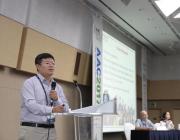摘要:
The particle phase state is a key factor for determining gas particle partitioning, particle reactive gas uptake, and multiphase chemical reactions, with associated links to secondary aerosol formation. In this study, the particle phase state was investigated by measuring particle rebound fraction fin the highly polluted atmosphere of Beijing, China. The particle phase state was sensitive to ambient relative humidity (RH). The particles changed from rebounding to adhering when the RH increased above 60%, suggesting a transition from the semisolid to liquid state. This transition RH was below the deliquescence RH of both (NH4)(2)SO4 and NH4NO3. Submicrometer particles were in the liquid state during heavy haze episodes. This might be because the elevated RH and inorganic fraction in particles resulted in an increase in aerosol liquid water content. The transition to a liquid phase state, marking the beginning of the haze episode, might kick off a positive feedback loop. The liquid particles might readily take up pollutants that then react to form inorganics, thereby further increasing the rate of water uptake. We propose that the liquid phase state facilitates the mass transfer and multiphase reactions of the particles, thereby accelerating secondary particle growth in haze over the North China Plain.